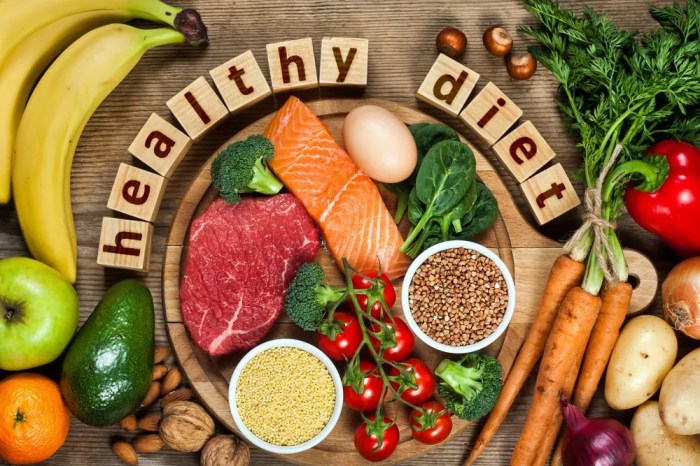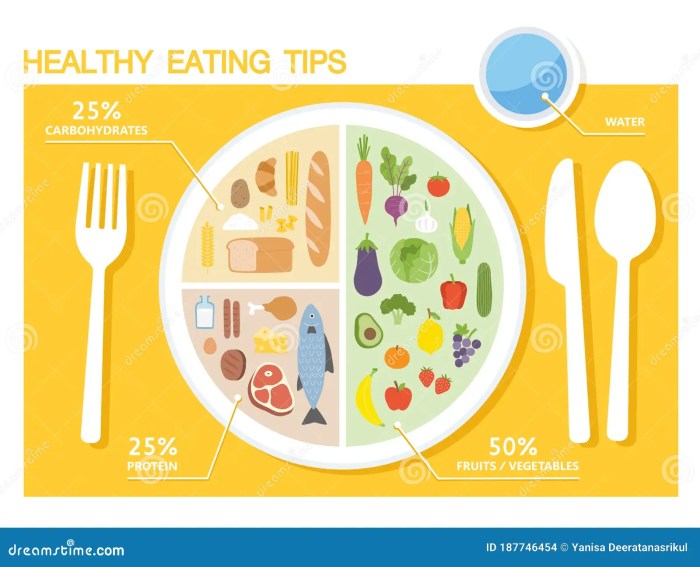Balanced Diet Tips, let’s break it down for you in a way that’s easy to digest. We’re talking about the key to feeling good inside and out, so buckle up and let’s dive in.
From nutrients to meal planning, we’ve got all the juicy details to help you rock that balanced diet like a boss.
Importance of a Balanced Diet: Balanced Diet Tips

A balanced diet is crucial for overall health as it provides the necessary nutrients our bodies need to function properly. By consuming a variety of foods in the right proportions, we can ensure that we are getting all the essential vitamins, minerals, and macronutrients needed for optimal health.
Key Nutrients for a Balanced Diet
Some key nutrients needed for a balanced diet include:
- Protein: essential for building and repairing tissues
- Carbohydrates: main source of energy for the body
- Fats: important for energy storage and hormone production
- Vitamins: necessary for various bodily functions
- Minerals: play a role in bone health, muscle function, and overall wellness
Impact of a Balanced Diet on Energy Levels and Mental Well-being
A balanced diet has a direct impact on our energy levels and mental well-being. When we fuel our bodies with the right nutrients, we are more likely to have sustained energy throughout the day and feel more alert and focused. Additionally, consuming a balanced diet can help improve mood and reduce the risk of mental health issues.
Components of a Balanced Diet

To maintain a healthy lifestyle, it is essential to have a balanced diet that includes a variety of food groups. Each food group provides different nutrients that are crucial for overall well-being.
Food Groups in a Balanced Diet
- 1. Fruits and Vegetables: These are rich in vitamins, minerals, and fiber. They help boost the immune system, aid in digestion, and reduce the risk of chronic diseases.
- 2. Proteins: Found in meat, poultry, fish, dairy, nuts, and seeds, proteins are essential for tissue repair, muscle growth, and hormone production.
- 3. Carbohydrates: Main sources include grains, fruits, and vegetables. Carbs are the body’s primary source of energy and support brain function.
- 4. Fats: Healthy fats from sources like avocados, nuts, and olive oil are crucial for hormone production, absorbing vitamins, and maintaining healthy cells.
- 5. Vitamins and Minerals: Found in a variety of foods, vitamins and minerals are essential for various bodily functions, such as bone health, energy production, and immune system support.
Importance of Fruits and Vegetables, Balanced Diet Tips
Fruits and vegetables are packed with essential vitamins, minerals, and antioxidants that help protect the body from diseases and support overall health. They also provide fiber, which aids in digestion and helps maintain a healthy weight.
Yo, have you ever thought about building a community on Facebook? It’s not just about likes and comments, it’s about creating a space where people can connect and share ideas. Check out this dope article on Building a Community on Facebook for some tips and tricks on how to make your group stand out in the crowded social media scene.
Let’s build something epic together!
Role of Proteins, Carbohydrates, Fats, Vitamins, and Minerals
Proteins are the building blocks of the body, essential for muscle growth and repair. Carbohydrates provide fuel for the body and brain, while fats are necessary for hormone production and cell function. Vitamins and minerals play crucial roles in various bodily functions, from supporting the immune system to promoting healthy skin and hair.
Hey, have you ever thought about building a community on Facebook? It’s a great way to connect with people who share your interests. Check out this awesome guide on Building a Community on Facebook to learn some tips and tricks on how to create a thriving online community. You’ll be a social media guru in no time!
Tips for Achieving a Balanced Diet
Eating a balanced diet is crucial for maintaining overall health and well-being. Here are some tips to help you achieve a balanced diet:
Meal Planning Strategies
- Plan your meals in advance to ensure you include a variety of food groups.
- Include a mix of fruits, vegetables, whole grains, lean proteins, and healthy fats in your meals.
- Try batch cooking on weekends to have nutritious meals ready for the week.
Portion Control and Mindful Eating
- Avoid eating in front of the TV or computer to focus on your food and prevent overeating.
- Use smaller plates and bowls to help control portion sizes.
- Eat slowly and savor each bite to give your body time to register fullness.
Eating the Rainbow
- Include a variety of colorful fruits and vegetables in your diet to ensure you get a wide range of nutrients.
- Each color represents different vitamins and minerals, so aim to “eat the rainbow” every day.
- Try incorporating different colored produce like berries, leafy greens, bell peppers, and squash into your meals.
Benefits of a Balanced Diet
Eating a balanced diet comes with a plethora of benefits that go beyond just weight management. It plays a crucial role in maintaining overall health and well-being.
Weight Management
- By consuming a variety of nutrient-rich foods in appropriate portions, a balanced diet can help regulate weight by providing the necessary nutrients without excess calories.
- It helps in reducing the risk of obesity and related health issues, promoting a healthy body composition and metabolism.
- Regularly following a balanced diet can contribute to sustainable weight loss and weight maintenance in the long term.
Immune Function and Chronic Disease Prevention
- A balanced diet rich in vitamins, minerals, and antioxidants can boost immune function, helping the body fight off infections and illnesses.
- It can reduce the risk of chronic diseases such as heart disease, diabetes, and certain cancers by providing essential nutrients that support overall health.
- Consuming a variety of foods from all food groups can help maintain optimal health and reduce inflammation in the body, lowering the risk of chronic conditions.
Skin Health and Longevity
- Nutrient-dense foods like fruits, vegetables, and healthy fats can improve skin health by promoting collagen production and elasticity, resulting in a clear and youthful complexion.
- A balanced diet can slow down the aging process by protecting against oxidative stress and free radicals that damage cells and accelerate aging.
- Healthy eating habits can improve overall quality of life and increase longevity by reducing the risk of age-related diseases and promoting overall well-being.
